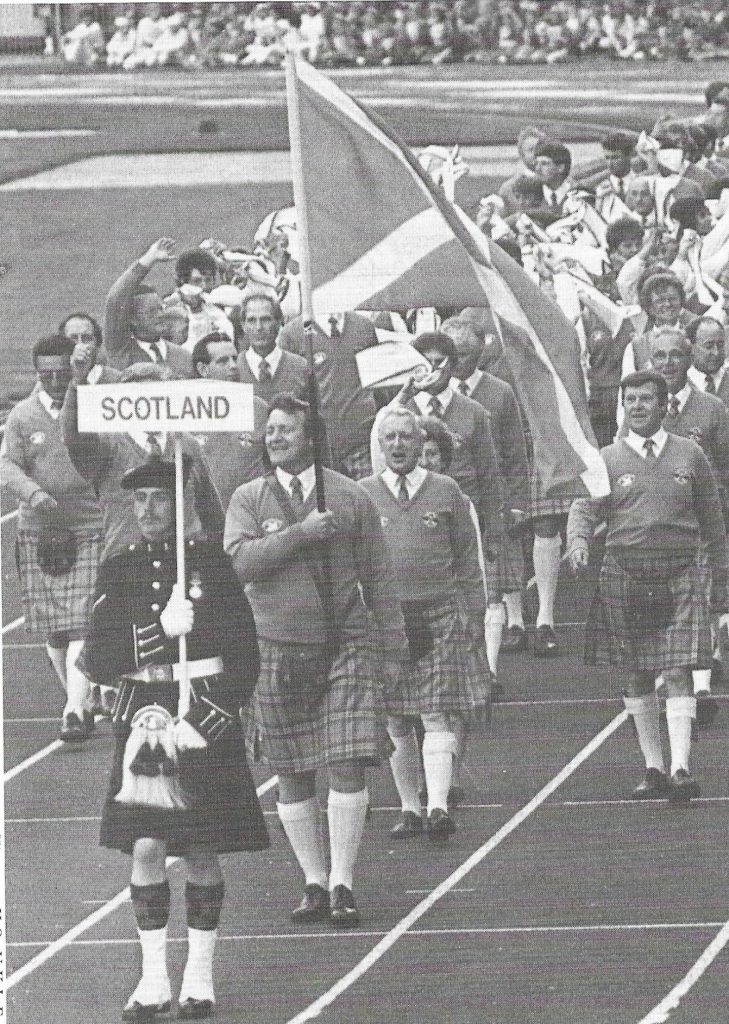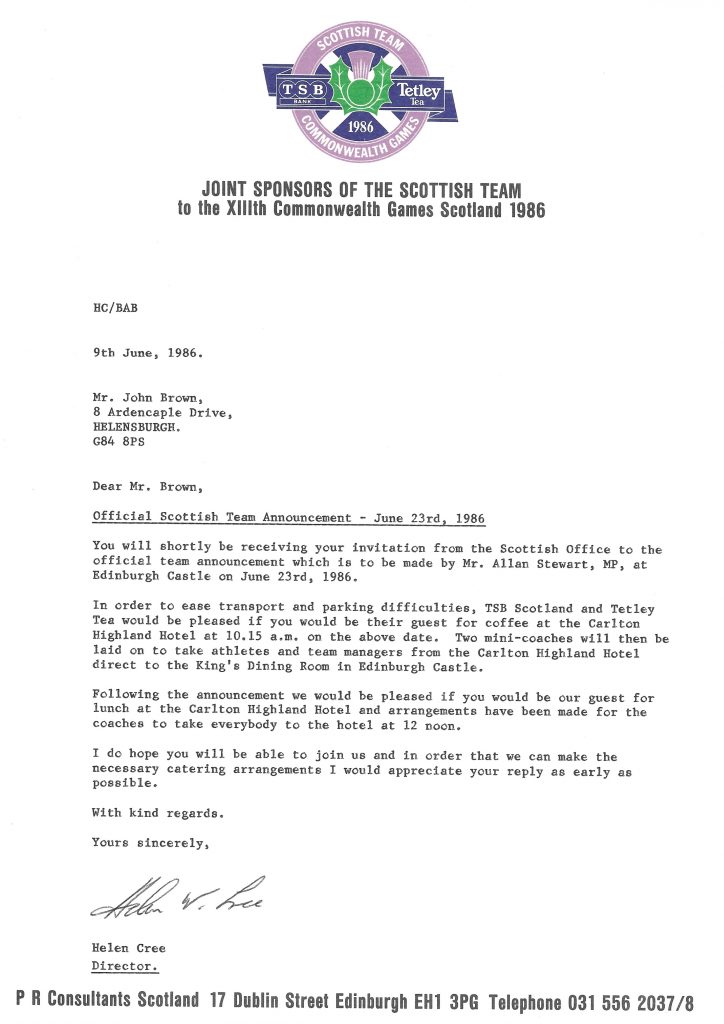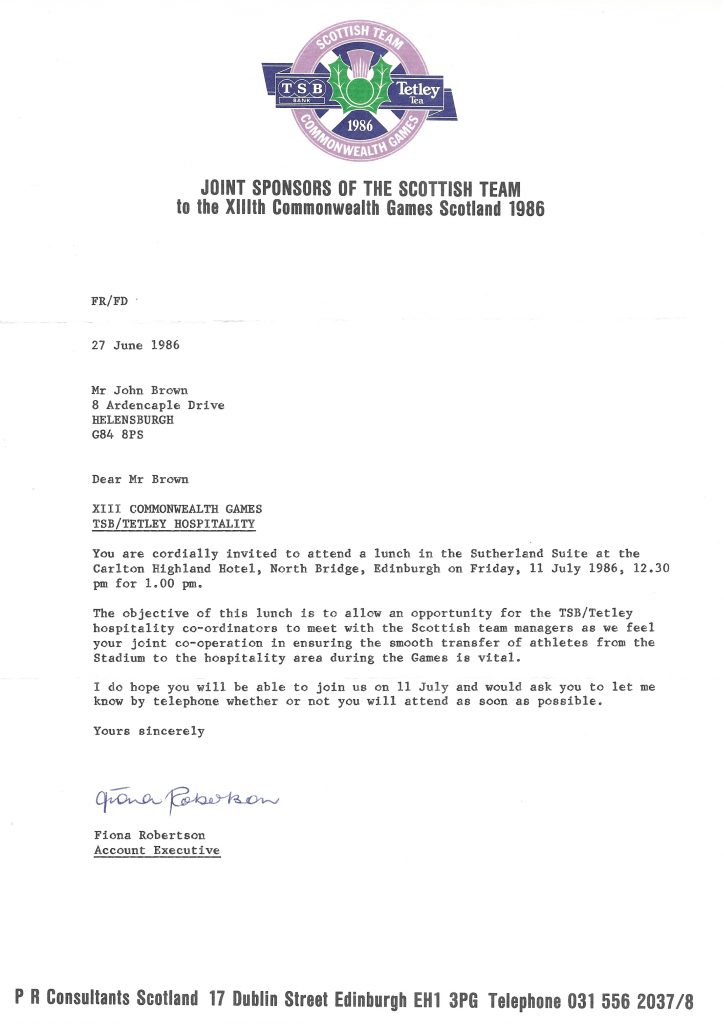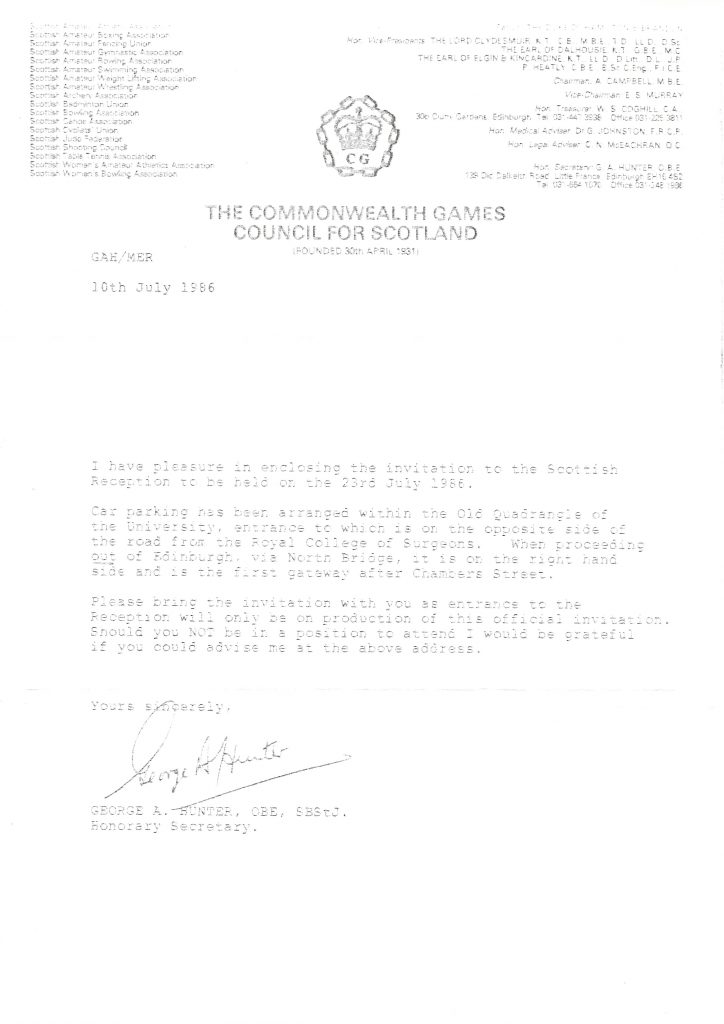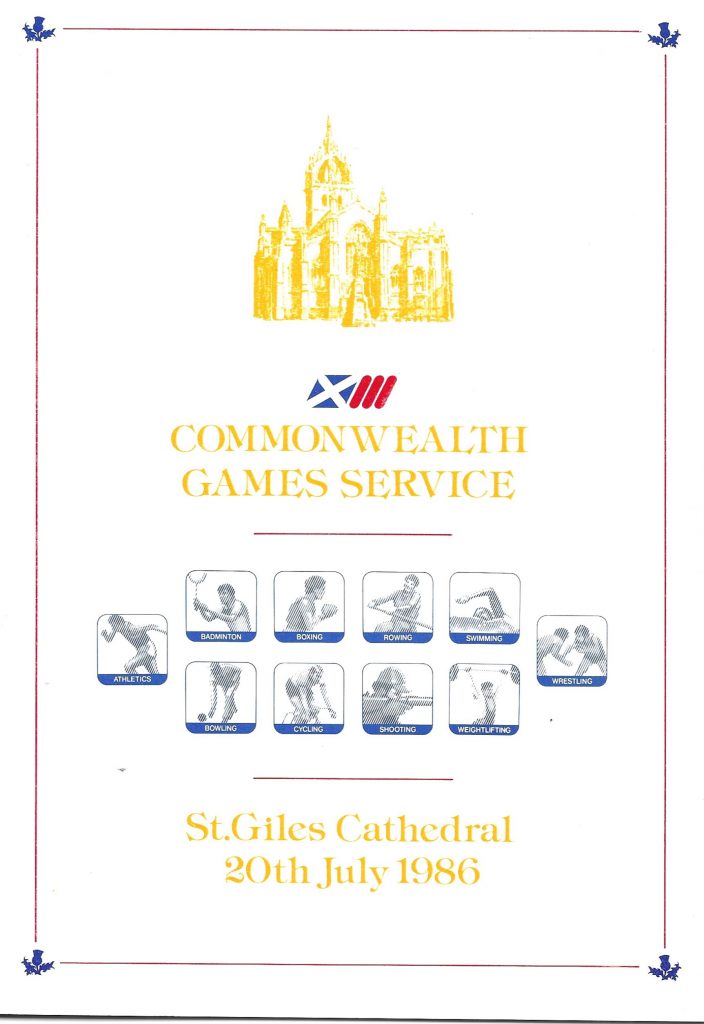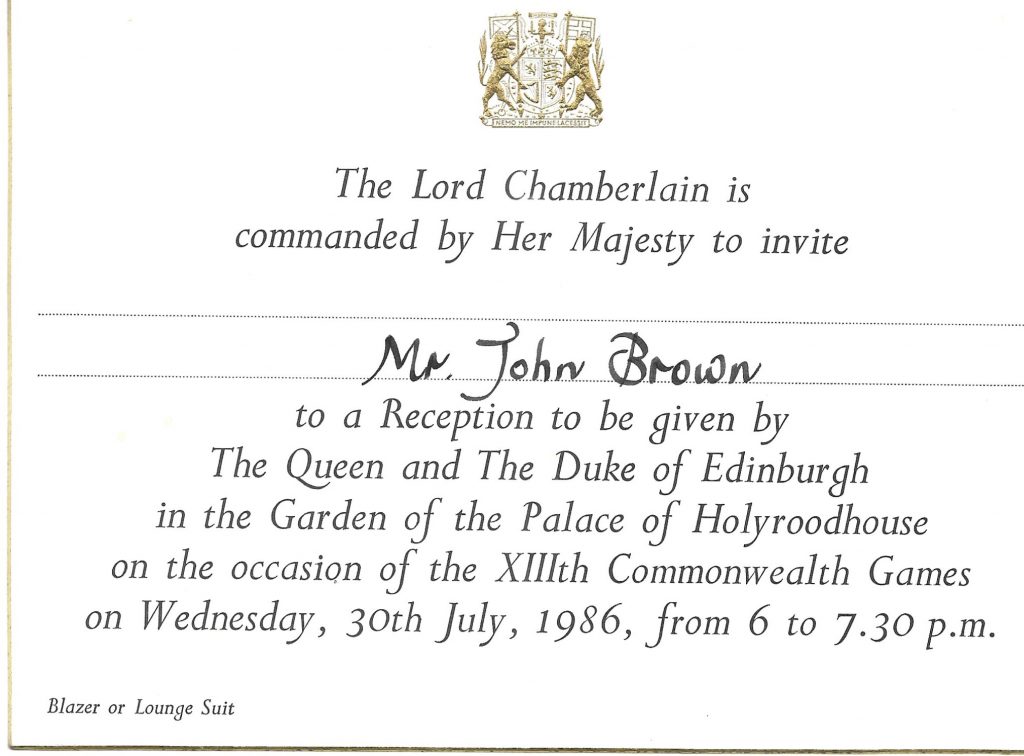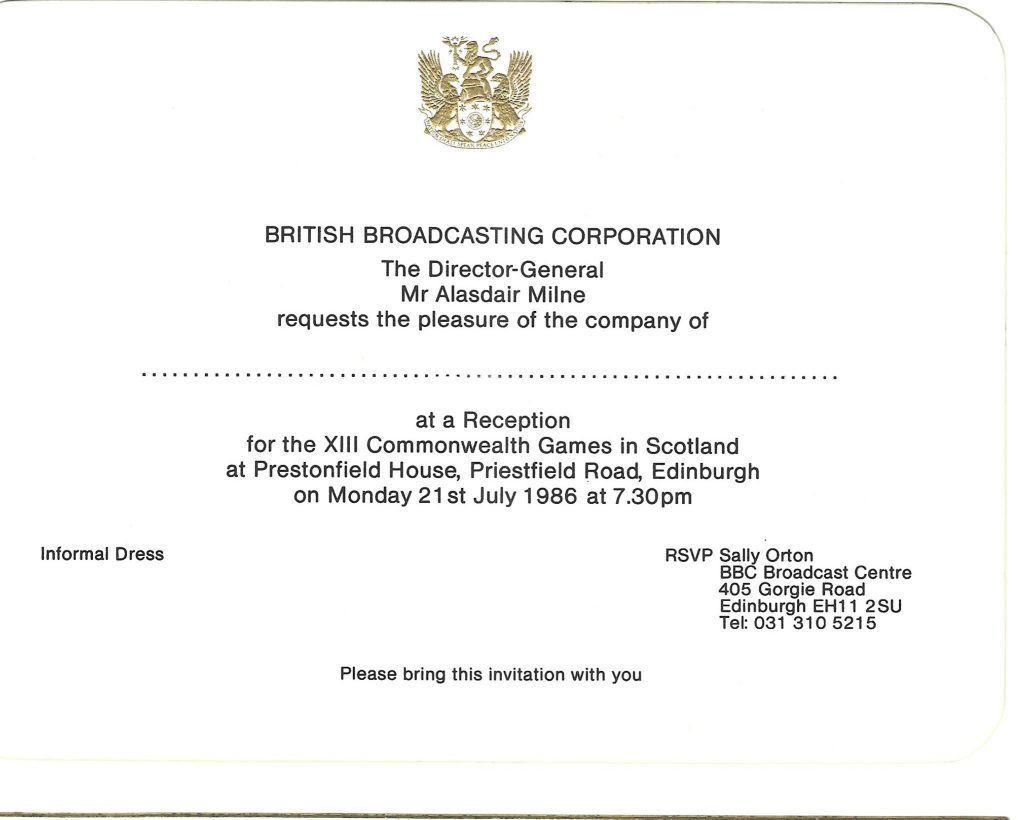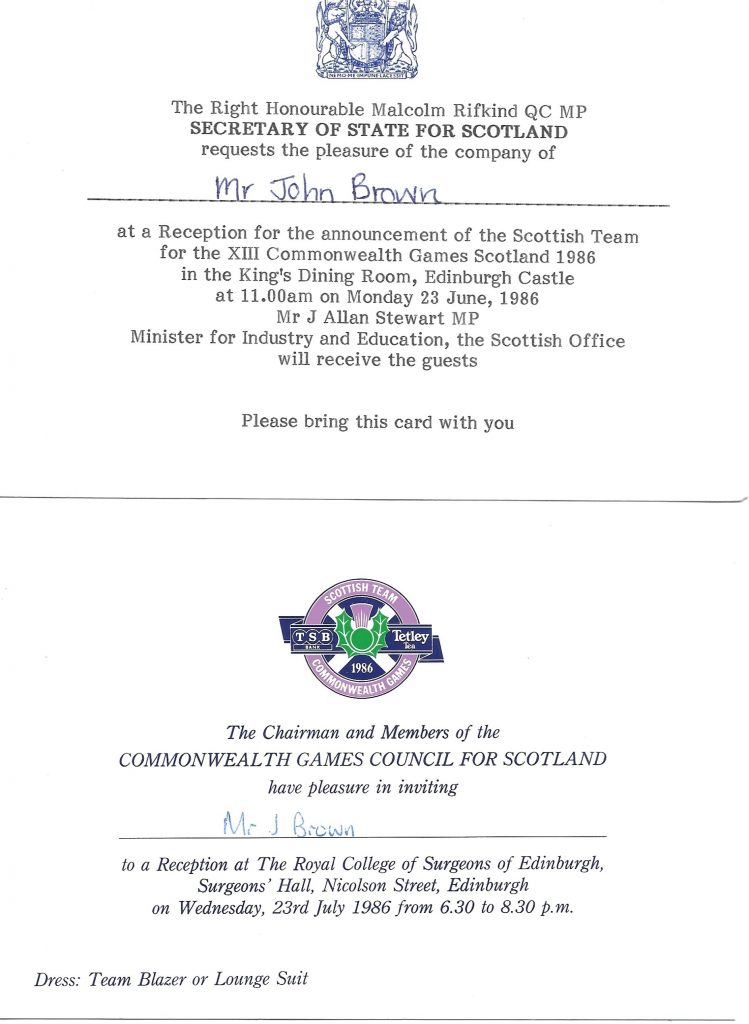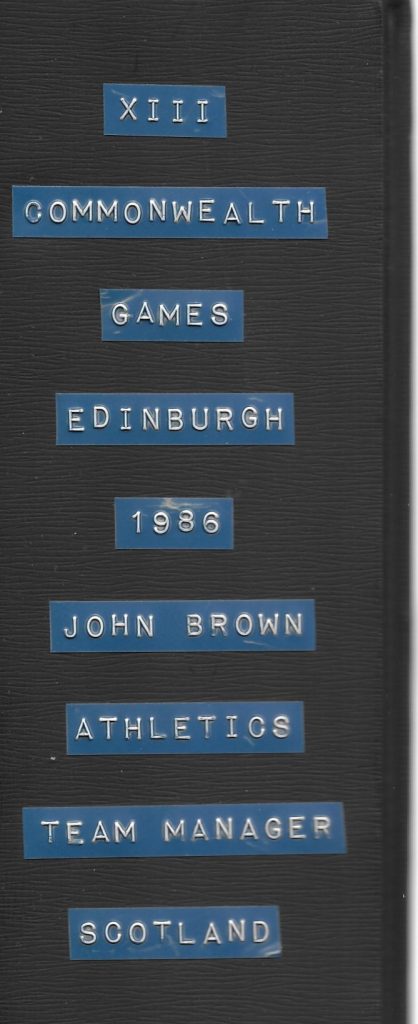This not a report on the 1986 Commonwealth Games. It is an account of the involvement of one of the country’s best ever administrators, John Brown, his selection, preparation and involvement in what was to be the first such involvement in many Games including four Olympics.
The Games Opening Parade: John is third from the left with his hand in the air!
The two and a half year lead in would be over at the end of July, 1986 and the Games would begin. John had been working hard and at increasing intensity as the Games approached – that intensity would increase and the pressure mount during the Games year itself rising to a crescendo during the two weeks of the actual competition. Much of the pressure for these Games would come from matters that had nothing to do with the athletics – or any other sport come to that.
The Games were boycotted by a majority of countries, largely African, Asian and Caribbean states, and making it appear as a whites-only event. Of the 59 eligible countries, 32 boycotted the Games due to the Thatcher government’s attitude towards British sporting links with apartheid-era South Africa as opposed to the sporting boycott of South Africa. It resulted in the lowest number of athletes since the 1950 Commonwealth Games
Further controversy came about when it was revealed that due to the lack of participation and associated decline in anticipated broadcasting and sponsorship revenues, the Organising Committee was facing a serious financial black hole, and the boycott ended any prospect of securing emergency government assistance. Businessman Robert Maxwell stepped in to offer funding, taking over as chairman, but despite promising to invest £2m, Maxwell’s contribution was just £250,000. On a budget of £14m, the Games opened with a deficit of £3m, which later grew to £4.3m, and instead of putting enough money into the event to save it, the new chairman of the Games asked creditors to forgo half the payment due to them to keep the event out of liquidation. The debt was finally paid off in 1989, with the city of Edinburgh losing approximately £500,000.
The papers were full of stories about Robert Maxwell and his pontificating but with little money coming to back it, the government refusing to commit to emergency assistance and so on. It was not a good atmosphere in which to hold the Games. In addition there were some notable absences from the Scottish teams selected with athletes who had a good record and who had managed to do the qualifying time, height or distance being admitted. One athlete offered to pay for his own uniform or even wear a genuine Scottish uniform issued earlier in the year to compete. Although there were only two running in the event in question and he had qualified, his offer was turned down.
And John Brown was the team manager who had done so much work and travel over two years to have the team ready. His task was much, much more difficult than it had to be. He was fortunate in having John Hamilton, the popular manager of the Scottish cross-country team as his assistant manager – and David Lease, national coach, as the team coach. All three were well acquainted with the athletes, had been with them on trips to various other countries, knew their likes and dislikes and David had even stepped in on one occasion when the team was short of a pole-vaulter to compete in the event himself (he had been an international vaulter for Wales several years earlier) which gained him personally some kudos. They needed all the experience and skills learned over the previous two years at least. Since 1984, John himself had been with 5 Scottish or Scottish Junior teams on 5 occasions in 1984 to venues as far afield at Budapest, London and Swansea, in 1985 he had been with 4 GB teams to Karlovac (Yugoslavia), Le Touquet, Genoa and Tel Aviv, and 5 Scottish teams to Dublin, Flora (Spain), Nice and Swansea as well as a couple of home fixtures. Their work with the actual team was done well, having been in the athletes village several times during the period of the Games I can say that it was a good atmosphere there and there were several genuine high spots for the Scottish tea, with Liz Lynch capturing the headlines for her win in the 10,000m, Yvonne Murray ran well in the 3000m and Tom McKean had a very good meeting with his running in the 800m among them.
John (and his wife) had to attend many Dinners, Lunches and Receptions which at times probably had to be endured rather than enjoyed but which were part of his official position. He had to meet sponsors, encourage supporters, attend official council events and so on as well as work with the team. There was the official team announcement to be made on 9th June and John’s presence was of course essential.
Then there was the meeting with the Tetley (Sponsor) hospitality co-ordinators –
The Commonwealth Games Council for Scotland had a Scottish Reception, held at the University in Edinburgh on 23rd July.
And there was always a Church Service which preceded every Games:
And many more at an increasing pace as the Games themselves drew nearer, an even after they had started.
Despite all the problems – political and financial – the XIII Commonwealth Games were a success due in no small part to the work done by dedicated officials and coaches like John Brown, Hilda Everett (Scottish women’s team coach), John Hamilton and David Lease as well as by the athletes in the arena. The performances and results can be found in many places on the internet such as Wikipedia or on this website at
www.scottishdistancerunninghistory.scot/1986-commonwealth-games
Finally, just to show that he was indicate that he was in fact working while he was expected to attend all the above functions – and more, the list above is not nearly a complete one – we finish with his report on the actual team performance.
EDINBURGH, SCOTLAND
26TH JULY – 13TH AUGUST 1986
Scottish team performance is summarised below:
3 – 1st places 12 – 2nd places 18 – 3rd places
SECTION MANAGERS REPORTS
ATHLETICS (Men) – John Brown – Section Manager
Travel: All athletes assembled at the Games Village under their own arrangements and no difficulties were encountered.
Accommodation: In contrast to the previous Games held in Brisbane in 1982, the accommodation provided in the Edinburgh University Pollock Halls of Residence was ideal. Team members shared, two per room, but with the athletes being allowed to determine their own extent of residence in the Village, and by making appropriate pairings, many enjoyed almost single room accommodation and this was very much appreciated by the athletes.
Training Facilities: The training faciities provided by the Organisers were found to be adequate for our requirements.
Medical Support: The mdical team of doctors and physiotherapists can only be described as superb. They were always on hand to provide expert care and atention in a very warm-hearted way, and on behalf of the athletes I would like to pay them a special tribute. Of the many athletes who consulted the Medical Team only Lindsay Robertson (marathon) was unable to compete.
Discipline: No member of the team required to be spoken to regarding discipline or behaviour in general, and all supported the various functions and meetings with Royalty.
Boycott: It was most unfortunate that the Games suffered from the boycott with a third of the competitors being excluded. In athletics very few potential medallists did not take part. The depleted fields however meant that a number of our athletes who would have benefited from an earlier round, were being thrown into semi-finals or finals of events. A number were unfortunate not to qualify for further rounds by the narrowest of margins.
Results * Aditional Event
100 metres
Bunney 5th 10.37; Henderson 8th 10.68; Sharp eliminated in semi-final 10.62
200 metres
McCallum eliminated in semi-final 21.39; Whittle eliminated in semi-final 21.69
400 metres
Whittle 5th 47.10; Johnston eliminated in semi-final 48.57; Nicoll eliminated in semi-final 50.07
800 metres
McKean 2nd 1:44.80; Forbes 7th 1:51.29
1500 metres
Currrie eliminated in heat 3:44.82; Hanlon eliminated in heat 3:50.57; Robson 9th 3:57.20
5000 metres
Muir 8th 13:40.92
10000 metres
Hutton – 30:16.50
3000 metres steeplechase
Charleson – 9:21.73; Hanlon – 8:53.56; Hume – 9:05.40
Marathon
Graham 4th 2:12:10; Clyne 10th 2:17:30; Robertson withdrawn on medical grounds
110 metres hurdles
Wallace eliminated in 1st semi-final 14.23; McDonald eliminated in 1st semi-final 14.37; Fraser eliminated in 1st semi-final 14.28
400 metres Hurdles
Fulton eliminated in 1st semi-final 57.90; McCutcheon eliminated in 1st semi-final 53.58; Hardie eliminated in 1st semi-final 55.68
Pole Vault
McStravick 8th 4.45m
High Jump
Parsons 2nd 2.28m
Long Jump
McKay 8th 7.39m
Triple Jump
Duncan 7th 15.68m
Hammer
Black 8th 63.88m
Shot
Irvine 9th 16.73m
Discus
Patience 52.54m
Javelin
Maxwell – 62.34m
Decathlon
McStravick 4th 7563 pts
4 x 110 Relay
Henderson, McCallum, Sharp, Bunney 3rd 40.41
4 x 400 Relay
Johnston, Forbes, McKean, Whittle 4th 3:18.43
